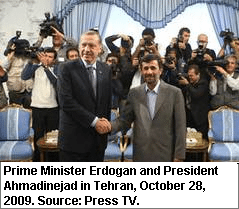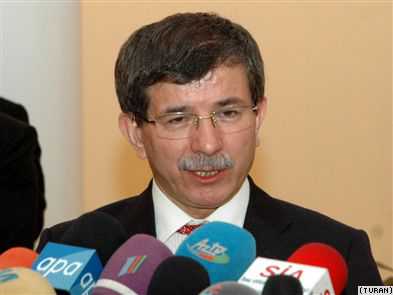By KENNETH CHANG
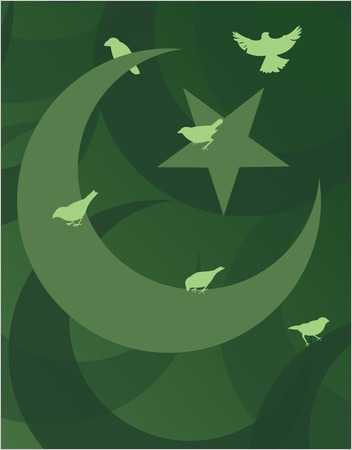
AMHERST, Mass. — Creationism is growing in the Muslim world, from Turkey to Pakistan to Indonesia, international academics said last month as they gathered here to discuss the topic.
But, they said, young-Earthcreationists, who believe God created the universe, Earth and life just a few thousand years ago, are rare, if not nonexistent.
One reason is that although the Koran, the holy text of Islam, says the universe was created in six days, the next line adds that a day, in this instance, is metaphorical: “a thousand years of your reckoning.”
By contrast, some Christian creationists find in the Bible a strict chronology that requires a 6,000-year-old Earth and thus object not only to evolution but also to much of modern geology and cosmology, which say the Earth and the universe are billions of years old.
“Views of scientific evolution are clearly influenced by underlying religious beliefs,” said Salman Hameed, who convened the two-day conference here at Hampshire College, where he is a professor of integrated science and humanities. “There is no young-Earth creationism.”
But that does not mean that all of evolution fits Islam or that all Muslims happily accept the findings of modern biology. More and more seem to be joining the ranks of the so-called old-Earth creationists. They do not quarrel with astronomers and geologists, just biologists, insisting that life is the creation of God, not the happenstance consequence of random occurrences.
The debate over evolution is only now gaining prominence in many Islamic countries as education improves and more students are exposed to the ideas of modern biology.
The degree of acceptance of evolution varies among Islamic countries.
Research led by the Evolution Education Research Center at McGill University, in Montreal, found that high school biology textbooks in Pakistan covered the theory of evolution. Quotations from the Koran at the beginning of the chapters are chosen to suggest that the religion and the theory coexist harmoniously.
In a survey of 2,527 Pakistani high school students conducted by the McGill researchers and their international collaborators, 28 percent of the students agreed with the creationist sentiment, “Evolution is not a well-accepted scientific fact.” More than 60 percent disagreed, and the rest were not sure.
Eighty-six percent agreed with this statement: “Millions of fossils show that life has existed for billions of years and changed over time.”
The situation in Turkey is different and changed only in the past couple of decades. One of the conference participants, Taner Edis, said he never encountered creationist undertones when he was growing up in Turkey in the 1970s. “I first noticed creationism when I came to America for graduate school,” said Dr. Edis, now a professor of physics at Truman State University in Missouri. He thought it an American oddity.
Some years later, while browsing a bookstore on a visit to Turkey, Dr. Edis found books about creationism filed in the science section. “It actually caught me by surprise,” he said.
In Turkey, officially a secular government but now ruled by an Islamic party, the teaching of evolution has largely disappeared, at least below the university level, and the science curriculum in public schools is written in deference to religious beliefs, Dr. Edis said.
Harun Yahya, a Turkish creationist of the old-Earth variety, has gained prominence in Turkey and elsewhere. A quarter of a world away, most of the biology teachers in Indonesia use Mr. Yahya’s creationist books in their classrooms, the McGill researchers found, although some said they did that to provide counterarguments to materials their students were reading anyway.
In the McGill research, fewer students in Indonesia than in Pakistan thought evolution a well-accepted scientific fact, yet 85 percent agreed that fossils showed that life had existed for billions of years and changed over time.
The quality of biology education “varies highly depending on what country you’re in and what school you’re in,” said Jason R. Wiles, a professor of biology at Syracuse Universityand associate director of the McGill center.
In addition, the situation in countries with a Shiite majority may be far different than in places where Sunnis are more numerous. There is no single leader, like the Roman Catholic pope, who can dictate an official view that holds for all Muslims.
Even finding out how different countries teach evolution can be difficult, Dr. Hameed said. Saudi Arabia, for example, does not let foreigners see the biology textbooks. “We don’t have much information,” he said.
For many Muslims, even evolution and the notion that life flourished without the intervening hand of Allah is largely compatible with their religion. What many find unacceptable is human evolution, the idea that humans evolved from primitive primates. The Koran states that Allah created Adam, the first man, separately out of clay.
Pervez A. Hoodbhoy, a prominent atomic physicist at Quaid-e-Azam University in Pakistan, said that when he gave lectures covering the sweep of cosmological history from the Big Bang to the evolution of life on Earth, the audience listened without objection to most of it. “Everything is O.K. until the apes stand up,” Dr. Hoodbhoy said.
Mentioning human evolution led to near riots, and he had to be escorted out. “That’s the one thing that will never be possible to bridge,” he said. “Your lineage is what determines your worth.”
Biology education, even in places like Pakistan that otherwise teach evolution, largely omits the question of where humans came from.
Some academics at the conference worried that the rejection of some aspects of evolution might leave Islamic countries at a disadvantage in scientific education. Dr. Hameed said a negative reaction to evolutionary theory could reflect a struggle to retain cultural traditions and values against Western influences, even though Islamic creationists readily borrowed many of the arguments from Western creationists, just removing the young-Earth aspects.
There is some indication that in the West, where non-Islamic influences are strongest, Islamic creationism may be stronger in reaction to the outside pressure. For example, high school students at Islamic schools in and near Toronto were far more doubting of evolution than students in Indonesia or Pakistan, the McGill researchers found. A majority of the students at the Canadian Islamic schools disagreed that a significant body of data supported evolution and that all life came from the same common ancestors.
At the same time, many of the Canadian Muslims even acquired young-Earth creationist beliefs, which are thoroughly Western in origin. Only half the students surveyed at the Islamic schools in the Toronto area thought fossils showed that life had existed for billions of years and had changed over time, compared with the 86 percent of the students in Pakistan.
In a study financed by the National Science Foundation, Dr. Hameed and his colleagues will survey the beliefs of Muslim doctors in five Muslim countries — Egypt, Iran, Malaysia, Pakistan and Turkey — and compare them with Muslim doctors in non-Muslim countries — Turkish doctors in Germany, Pakistani doctors in Britain, and Turkish and Pakistani doctors in the United States.
“We actually expect, especially in Europe, where they have a harder time merging in the culture,” Dr. Hameed said, “harsher rejection of evolution in England and Germany” than in Muslim countries.
Source: www.nytimes.com, November 2, 2009



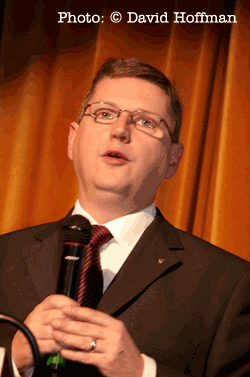

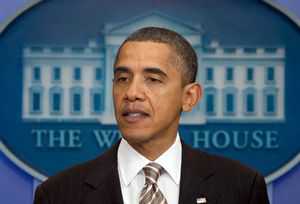
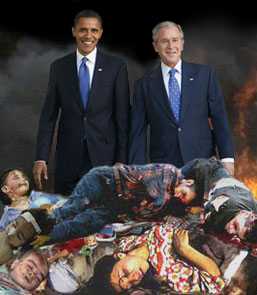 In complete realization of the ‘change’ mantra:
In complete realization of the ‘change’ mantra: